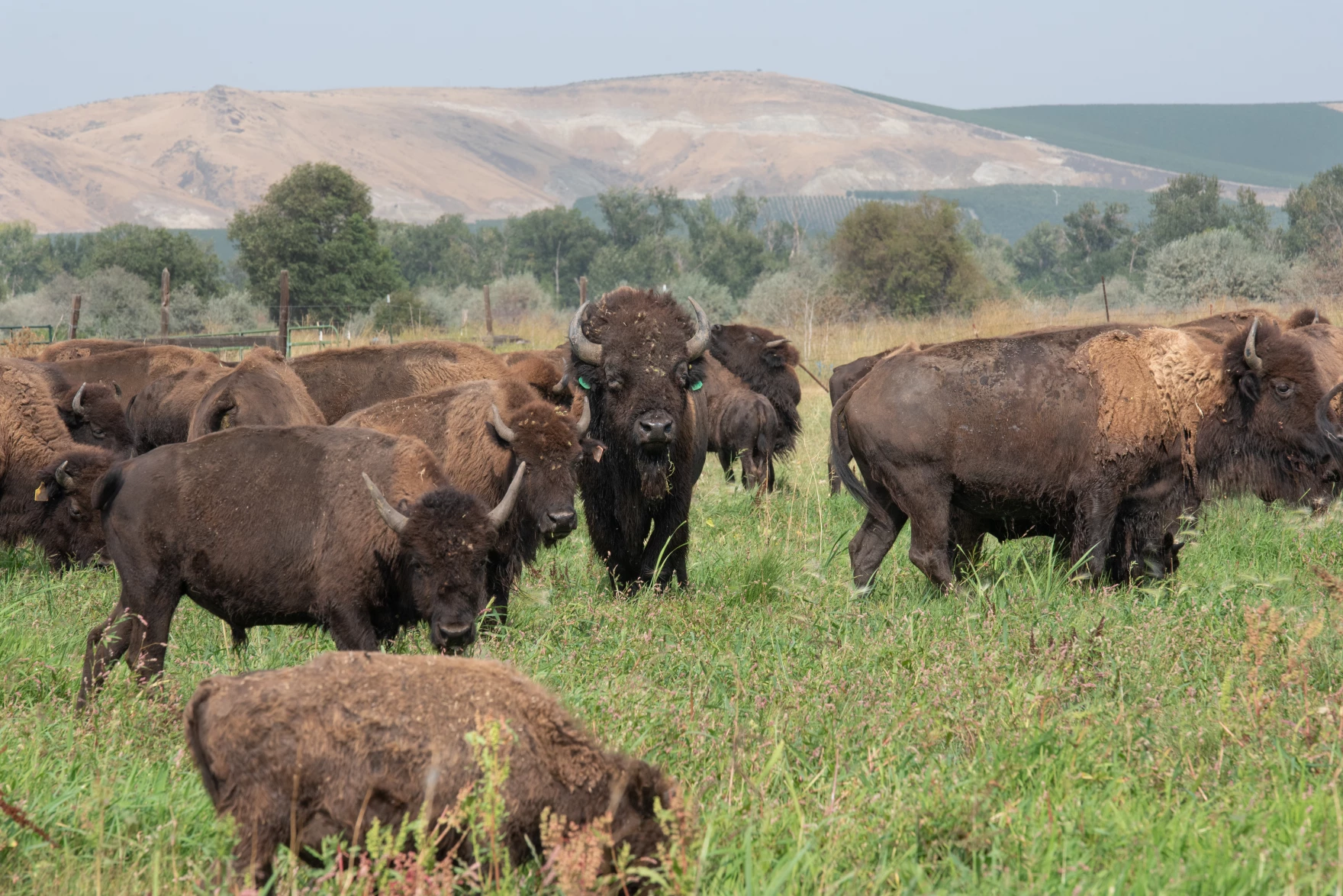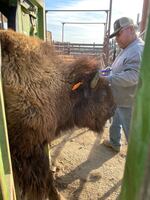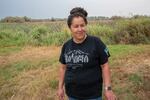A buffalo herd is a rare sight in Washington. But on the edge of the Yakima River, not far from an interstate, nearly 200 buffalo roam fields surrounding a small farming town called Toppenish.

Two years ago, the InterTribal Buffalo Council awarded the Yakama Nation a family group of 26 buffalo from Yellowstone. This male buffalo, identifiable by a blue ear tag in the center, was brought to the tribe’s Satus Ranch to help increase genetic diversity within the herd.
Annie Warren / Northwest Public Broadcasting
“You can actually feel them running towards you,” said Darwin Sockzehigh, who has managed the Yakama Nation’s buffalo herd for the past five years. “Their power behind them and especially when they’re all bunching up. They’re all bumping off each other and you can hear the grunts and their breath and their bodies moving.”
Two years ago, the InterTribal Buffalo Council awarded the tribe a family group of 26 buffalo from Yellowstone to help Yakama Nation members become more food sovereign, according to Tribal Council member Caseymac Wallahee.
Traditionally, Wallahee said tribal members gather, hunt and fish for food. Managed from Satus Ranch, the tribe has been working on developing a buffalo herd since the early ‘90s. Though buffalo are not typical for this region, tribally-raised buffalo provides a healthier meat for members to consume.

Darwin Sockzehigh administers a vaccine to a buffalo cow at the tribe’s Satus Ranch during last year’s round up.
Kristi Olney / Northwest News Network
The Yakama Nation Wildlife Program hopes to create genetic diversity within the herd with the Yellowstone buffalo, said Kristi Olney, lead biologist for the program.
“The Yellowstone buffalo, they’re more pure, more wild,” she said.
That means less bovine genetics in the herd – which could eventually make the meat even leaner and healthier than beef, and a better option for tribal members to eat.

Kristi Olney is the lead biologist for the Yakama Nation Wildlife Program, which oversees the buffalo herd. She said the tribe brought in buffalo from Yellowstone to create genetic diversity within the herd.
Annie Warren / Northwest Public Broadcasting
While buffalo aren’t part of the Yakama Nation’s culturally important foods, Wallahee said there’s evidence some Yakama hunters traveled east – buffalo bones and hides have been found there. For centuries, tribal ancestors also traded for buffalo at the region’s largest trading center, Celilo Falls on the Columbia River.
The tribe has so successfully bred and raised its herd that biologists and tribal members from the Confederated Tribes of the Warm Springs in Central Oregon toured Satus Ranch for advice. The Warm Springs tribe says it’s considering building up its own buffalo herd – but that’s still years away.
For Yakama Nation, the goal is to sustain around 200 buffalo on a healthy pasture. One day, the tribes hopes to donate meat to the Yakama Nation Head Start program, Yakama Legends Casino daycare center and the elders program.
Right now, the buffalo program is self-funded through meat sales, Olney said.
“The buffalo have to pay for themselves. Everything that the buffalo make just comes right back into them,” she said.
Yakama Nation member Jonathon Brown started buying buffalo meat last year, buying a little more with every paycheck. It’s a staple for his family.
“We do spaghetti. Of course, patties. We just mix it with rice. We just kind of be creative with it,” Brown said. “We make buffalo chili. I think that’s my favorite thing, with fry bread, of course.”

The Yakama Nation has a freezer full of buffalo hamburger and stew meat. The buffalo program aims to sustain itself through meat sales to both tribal and non-tribal members. Eventually, program leaders say they would like to be able to donate meat to the tribal headstart program, casino daycare and the elders program.
Annie Warren / Northwest Public Broadcasting
Sockzehigh said when the herd wants to move, it moves. And sometimes escapes. He’s gotten calls to help bring the herd back from Granger, a city roughly seven miles away. And once, even farther down the road, when they jumped the Yakima River and made their way closer to Mabton, nine miles in the opposite direction.
But Sockzehigh says the program is just heading where it’s supposed to go.
“It’s really good food. It’s good meat to eat. So yeah, I just kind of want to bring that back here to our tribe to let them know that, too,” he said.
Copyright 2023 Northwest News Network. To see more, visit Northwest News Network.